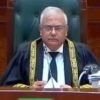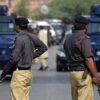NEW YORK: Pakistan has called for decisive action to address the UN Security Council’s veto power, arguing that it has repeatedly crippled the 15-member body’s ability to maintain global peace and security.
Speaking during a UN General Assembly debate on the veto, Pakistan’s Permanent Representative Ambassador Asim Iftikhar Ahmad said the Council has been left “paralyzed” by the geopolitical rivalries and veto use of its five permanent members the US, China, Russia, France, and the UK.
“Experience has shown time and again that meaningful Security Council reform must include either abolishing the veto or, at the very least, imposing strict limitations on its use,” the envoy stressed.
He welcomed initiatives aimed at revitalizing the General Assembly’s role in situations where a veto is cast, noting that these measures do not interfere with the ongoing Inter-Governmental Negotiations (IGN) on Council reform.
Under a landmark 2022 General Assembly resolution, the full Assembly must convene automatically within 10 days whenever a permanent member exercises the veto, with the goal of promoting transparency and accountability.
Ambassador Ahmad reiterated Pakistan’s and the Uniting for Consensus (UfC) group’s position against expanding the Council by adding new permanent members. More permanent seats, he argued, would only “intensify paralysis” and undermine the body’s effectiveness.
“The solution cannot be to multiply the problem,” he told the 193-member Assembly, pushing instead for a new category of longer-term, re-electable non-permanent seats — the compromise model proposed by the UfC.
He added that the negative impact of the veto could be mitigated by both restricting its use and enhancing the representation and tenure of non-permanent members, while ensuring any reform remains consistent with the UN Charter.
Opening the debate, General Assembly President Annalena Baerbock warned that the Council’s recurring deadlock has become symbolic of global institutional stagnation. The UN, created to prevent future wars, risks losing credibility when the Council is blocked on critical crises, she said.
“When the Council cannot act on the world’s most severe conflicts, people understandably begin to doubt not just the Security Council, but the UN as a whole,” Baerbock cautioned.



